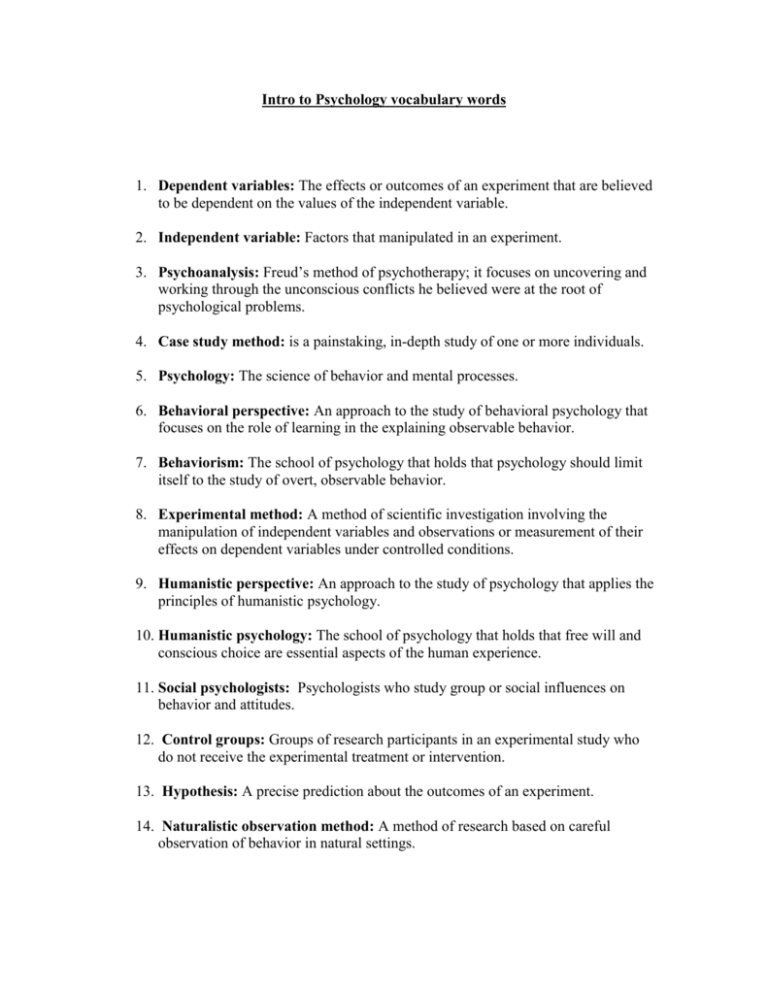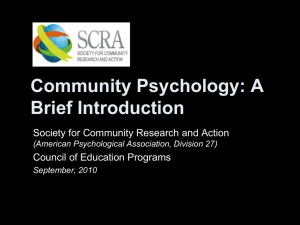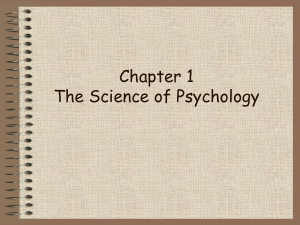Dependent variables
advertisement

Intro to Psychology vocabulary words 1. Dependent variables: The effects or outcomes of an experiment that are believed to be dependent on the values of the independent variable. 2. Independent variable: Factors that manipulated in an experiment. 3. Psychoanalysis: Freud’s method of psychotherapy; it focuses on uncovering and working through the unconscious conflicts he believed were at the root of psychological problems. 4. Case study method: is a painstaking, in-depth study of one or more individuals. 5. Psychology: The science of behavior and mental processes. 6. Behavioral perspective: An approach to the study of behavioral psychology that focuses on the role of learning in the explaining observable behavior. 7. Behaviorism: The school of psychology that holds that psychology should limit itself to the study of overt, observable behavior. 8. Experimental method: A method of scientific investigation involving the manipulation of independent variables and observations or measurement of their effects on dependent variables under controlled conditions. 9. Humanistic perspective: An approach to the study of psychology that applies the principles of humanistic psychology. 10. Humanistic psychology: The school of psychology that holds that free will and conscious choice are essential aspects of the human experience. 11. Social psychologists: Psychologists who study group or social influences on behavior and attitudes. 12. Control groups: Groups of research participants in an experimental study who do not receive the experimental treatment or intervention. 13. Hypothesis: A precise prediction about the outcomes of an experiment. 14. Naturalistic observation method: A method of research based on careful observation of behavior in natural settings. 15. Survey method: A research method that uses structured interviews or questionnaires to gather information about groups of people. 16. Theories: Formulations that account for relationships among observed events or experimental findings in ways that make them more understandable and predictable. 17. Behavior therapy: A form of therapy that involves the systematic application of the principles of learning. 18. Functionalism: The school of psychology that focuses on the adaptive functions of behavior. 19. Structuralism: The school of psychology that attempts to understand structure of the mind by breaking it down into its components parts. 20. Correlation coefficient: A statistical measure of association between variables that can vary from -1.00 to +1.00. 21. Evolutionary psychology: A branch of psychology that focuses on the role of evolutionary processes in shaping behavior. 22. Gestalt psychology: The school of psychology that holds that the brain structures our perceptions of the world in terms of meaningful patterns or wholes. 23. Health psychologists: Psychologists who focus on the relationship between psychological factors and physical health. 24. Operational definition: A description of an experimental procedure for the translation of a variable into measurements or numeric value. 25. Experimental group: A group of subjects that are exposed to the variable of a control experiment. 26. Cognitive perspective: An approach to the study f psychology that focuses on the processes by which we acquire knowledge. 27. Correlational method: A research method that examines relationships between variables. 28. Psychodynamic perspective: The views that behavior is influenced by the struggle between unconscious sexual or aggressive impulses and opposing forces that try to keep this threatening material out of consciousness. 29. Random assignment: A method of randomly assigning research participants to experimental or control groups. 30. Mean: The arithmetic average of a score in a distribution. 31. Unconscious: In Freudian theory, the part of the mind that lies outside the range of awareness and that contains primitive drives or instincts and unacceptable urges, whishes, or ideas. 32. Normal distribution: It shows the approximate percentages of cases falling one and two standard deviations from the mean. 33. Developmental psychologists: Study people’s physical, cognitive, social, and personality development throughout the life span. 34. Double-blind studies: In drug research, studies in which research participants and experimenters are kept uniformed about which participants receive the active drug and which receive the placebo. 35. Median: The middle score in a distribution, above and below which half of the scores fall. 36. Mode: The most frequent score in a distribution of scores. 37. Natural Selection: The evolutionary process by which individuals of a species that are best adapted to their environment is the ones most likely to survive and pass along their traits to succeeding generation. 38. Psychophysics: The study of relationship between features of physical stimuli, such as their intensity, and the sensations we experience in response to them. 39. Introspection: Inward focusing on mental experiences, such as sensations or feelings. 40. Sample: Subsets of a population. 41. Standard deviation: A measure of variability defined as the average difference between each individual score and the mean of all scores in the data set. 42. Inferential statistics: Procedures for making generalizations about a population by studying the characteristics of samples drawn from the population. 43. Placebo effects: Positive outcome of an experiment resulting from a participant’s expectations about whether they are receiving the experimental drug or a placebo. 44. Placebo: An inert substance or experimental condition that resembles the active treatment. 45. Range: A measure of variability that is given by the difference value between the highest and lowest scores in a distribution of scores. 46. Descriptive statistics: Procedures used for classifying and summarizing information in numerical form--in short, for describing data.








